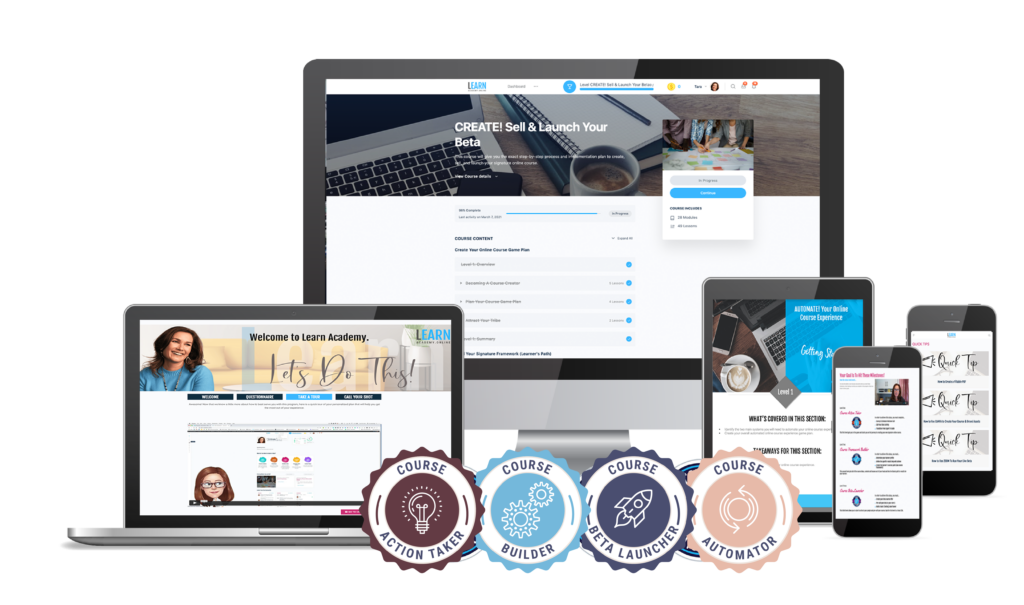Let me guess—you started your business with a passion to help people, make an impact, and finally get out of the 9-to-5 grind. Then you thought that to grow, you needed to scale by adding – when the reality is that scaling by simplifying is actually going to get you to the results you crave.
Because remember, at the beginning things were exciting. Clients were coming in, you were busy (in a good way), and you were finally making money on your own terms.
But fast forward a few months—or years—and you might be feeling stuck. You’re maxed out, juggling client calls, emails, delivery work, and maybe even trying to launch something new just to keep the momentum going.
You’re working hard, but you’re starting to wonder: Is this what scaling is supposed to feel like?
Spoiler alert: it’s not.
The Real Reason You Feel Stuck: The Time-for-Money Trap
Most of us start out by trading time for money—coaching sessions, done-for-you services, consulting packages. And hey, that works… until it doesn’t.
I remember one of my clients, Jen, a brilliant branding strategist, telling me, “Tara, I’m fully booked… and still not hitting my income goals. How is that possible?”
The truth was, she had no more hours to give. Every time she took on a new client, she had to stretch herself thinner. And when she tried to raise her prices, she hit resistance—internally and externally.
This is the time-for-money trap. And it’s the #1 reason most businesses don’t scale.
It creates a glass ceiling: your revenue is capped by your availability. Your business starts to feel like a job again—except now, you’re the boss, the employee, the admin, the tech support, and the customer service rep.
Why “More” Isn’t the Answer
Here’s the mistake I see over and over again: when entrepreneurs hit that ceiling, they think the answer is to do more.
More offers.More content.More launches.More platforms.
But all of that “more” just adds more complexity. More to manage. More to fix when it breaks. More things pulling your attention away from what actually moves the needle.
I worked with a wellness coach named Amanda who had five different programs running simultaneously—a group program, a VIP 1:1 offer, a monthly membership, a self-paced course, and a content subscription. She was exhausted.
When we simplified her business down to one core authority framework and one delivery model, she cut her workload by half and doubled her income in three months.
You don’t need more. You need less. But better.
The Shift: Scaling by Simplifying
Let me paint a picture.
When I first transitioned out of my 1:1 service model, I had a million ideas. (Sound familiar?)
Courses, memberships, done-for-you packages, consulting retainers… it was like building a buffet of options for every kind of client.
And guess what? I made it harder for people to buy. Not easier.
What actually worked?
Focusing on one authority framework, one signature offer, one customer journey, and one delivery system that freed up my time and gave my clients even better results.
The breakthrough came when I realized that scaling wasn’t about stacking services on top of each other. It was about creating a business model that could grow without me having to do more.
Here’s What That Looks Like in Practice:
1. Productize What You Know
Instead of charging for your time, package your expertise into something that people can consume or implement without you.
That could be a workshop series, a group program, or a self-paced digital product.
One of my clients turned her 1:1 mindset coaching process into a 6-week group experience. Not only did her income jump—she actually found she was better at coaching in the group setting because she wasn’t so drained from back-to-back calls.
Another example: I helped a marketing consultant create a “starter kit” for new clients—a bundle of templates and explainer videos. It cut her onboarding time from six hours to 45 minutes, and she now sells that kit as a standalone product to generate passive revenue.
2. One-to-Many Models
Switching from 1:1 to 1-to-many doesn’t mean you lose the personal touch. You just deliver it in a more structured, scalable way.
Rachel, the bookkeeper I mentioned earlier, didn’t believe group models could work in a service-based business. But by turning her recurring processes into a guided group system with weekly check-ins, her clients got better results—and she finally had weekends off.
Another client, Chris, ran live group sessions teaching how to launch a podcast. By offering weekly group calls, a digital workbook, and a private community, he served 40 clients a month with the same time it used to take to serve 4.
3. Systems and Simplicity
If your business needs you to be in every part of it, it’s not scalable. Period.
Start with simple systems. Automate your follow-ups. Create a rinse-and-repeat way of delivering your core offer. Document the things that drain your time so someone else can take them on later.
Ask yourself: What parts of my customer experience can I automate or templatize without sacrificing value?
A former client, Donna, runs a career coaching business. She now uses a tool to automate welcome emails, schedule sessions, and deliver pre-work to new clients. It saves her hours a week and her clients feel even more taken care of.
I like to say: simplify before you scale.
Doing Less, Better
Here’s what I want you to take away: scaling isn’t about adding more.
It’s about doing less—but doing it better.
It’s about focusing on the 20% of your business that brings in 80% of your results.
It’s about building a business that supports your life—not one that constantly needs you to feed it.
And it’s about shifting from being busy… to being effective.
6 Steps to Start Simplifying Today:
Step 1: Conduct a Business Audit
List every offer, platform, and major activity you’re currently doing.
Identify which ones are bringing in revenue vs. draining your time.
Step 2: Create your signature authority framework.
Based on your business audit, start to document the step-by-step path or process you use to get your clients from the starting point to the outcome they desire. Identify the stages/levels and steps to go from one to the other. This becomes your packaged IP.
Step 3: Pick One Signature Offer
What’s the ONE offer that creates the biggest transformation for your clients?
Focus on making that offer scalable, repeatable, and easy to deliver.
Step 4: Document and Delegate
Create SOPs (standard operating procedures) for repeat tasks.
Hire a VA or tech support when you’re ready.
Step 5: Automate the Repetitive
Email sequences, scheduling, onboarding, delivery content—use tools to do the heavy lifting.
Step 6: Streamline Your Client Journey
What is the simplest path a client can take from interest to result?
Eliminate steps that don’t add value.
Ask Yourself: What can I eliminate that’s not directly tied to my core offer?
What’s the simplest, most impactful way I can deliver results?
If I had to triple my client load tomorrow without adding hours—how would I do it?
(Hint: your scalable model is in those answers.)
Final Thoughts
Scaling is not about having a bigger team, more offers, or longer hours. It’s about designing a business that can grow while you step back, not lean further in.
It’s about escaping the cycle of “more” and replacing it with margin, clarity, and momentum.
And the way to get there? Simplify. Then scale.
Need help figuring out where to start?
Take the Scalable Expert Quiz to discover your next move or schedule a free strategy call.
Let’s stop glorifying hustle. Let’s start building smarter.







